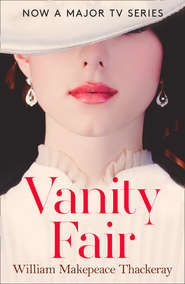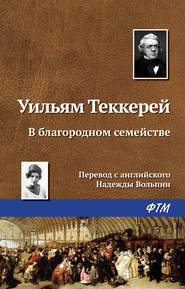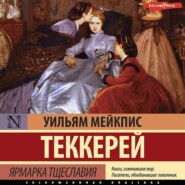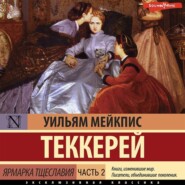По всем вопросам обращайтесь на: info@litportal.ru
(©) 2003-2024.
✖
A History of Pendennis. Volume 1. His fortunes and misfortunes, his friends and his greatest enemy
Настройки чтения
Размер шрифта
Высота строк
Поля
"Enough to make poor Mr. Pendennis turn in his grave," said Mrs. Wapshot.
"She never liked him, that we know," says No. 1.
"Married him for his money. Every body knows that; was a penniless hanger-on of Lady Pontypool's," says No. 2.
"It's rather too open, though, to encourage a lover under pretense of having a tutor for your son," cried No. 3.
"Hush! here comes Mrs. Portman," some one said; as the good rector's wife entered Madame Fribsby's shop, to inspect her monthly book of fashions just arrived from London. And the fact is, that Madame Fribsby had been able to hold out no longer; and one day, after she and her lodger had been talking of Pen's approaching departure, and the curate had gone off to give one of his last lessons to that gentleman, Madame Fribsby had communicated to Mrs. Pybus, who happened to step in with Mrs. Speers, her strong suspicion, her certainty almost, that there was an attachment between a certain clerical gentleman and a certain lady, whose naughty son was growing quite unmanageable, and that a certain marriage would take place pretty soon.
Mrs. Portman saw it all, of course, when the matter was mentioned. What a sly fox that curate was! He was low-church, and she never liked him. And to think of Mrs. Pendennis taking a fancy to him after she had been married to such a man as Mr. Pendennis! She could hardly stay five minutes at Madame Fribsby's, so eager was she to run to the Rectory and give Doctor Portman the news.
When Doctor Portman heard this piece of intelligence, he was in such a rage with his curate, that his first movement was to break with Mr. Smirke, and to beg him to transfer his services to some other parish. "That milksop of a creature pretend to be worthy of such a woman as Mrs. Pendennis," broke out the doctor: "where will impudence stop next?"
"She is much too old for Mr. Smirke," Mrs. Portman remarked: "why, poor dear Mrs. Pendennis might be his mother almost."
"You always choose the most charitable reason, Betsy," cried the rector. "A matron with a son grown up – she would never think of marrying again."
"You only think men should marry again, Doctor Portman," answered his lady, bridling up.
"You stupid old woman," said the doctor, "when I am gone, you shall marry whomsoever you like. I will leave orders in my will, my dear, to that effect: and I'll bequeath a ring to my successor, and my ghost shall come and dance at your wedding."
"It is cruel for a clergyman to talk so," the lady answered, with a ready whimper: but these little breezes used to pass very rapidly over the surface of the doctor's domestic bliss; and were followed by a great calm and sunshine. The doctor adopted a plan for soothing Mrs. Portman's ruffled countenance, which has a great effect when it is tried between a worthy couple who are sincerely fond of one another; and which I think becomes "John Anderson" at three-score, just as much as it used to do when he was a black haired young Jo of five-and-twenty.
"Hadn't you better speak to Mr. Smirke, John?" Mrs. Portman asked.
"When Pen goes to college, cadit quæstio," replied the rector, "Smirke's visits at Fairoaks will cease of themselves, and there will be no need to bother the widow. She has trouble enough on her hands, with the affairs of that silly young scapegrace, without being pestered by the tittle-tattle of this place. It is all an invention, of that fool, Fribsby."
"Against whom I always warned you – you know I did, my dear John," interposed Mrs. Portman.
"That you did; you very often do, my love," the doctor answered, with a laugh. "It is not from want of warning on your part, I am sure, that I have formed my opinion of most women with whom we are acquainted. Madam Fribsby is a fool, and fond of gossip, and so are some other folks. But she is good to the poor: she takes care of her mother, and she comes to church twice every Sunday. And as for Smirke, my dear – " here the doctor's face assumed for one moment a comical expression, which Mrs. Portman did not perceive (for she was looking out of the drawing-room window, and wondering what Mrs. Pybus could want, cheapening fowls again in the market, when she had had poultry from Livermore's two days before) – "and as for Mr. Smirke, my dear Betsy, will you promise me that you will never breathe to any mortal what I am going to tell you as a profound secret?"
"What is it, my dear John? – of course I won't," answered the rector's lady.
"Well then – I can not say it is a fact, mind – but if you find that Smirke is at this moment – ay, and has been for years – engaged to a young lady, a Miss – a Miss Thompson, if you will have the name, who lives on Clapham Common – yes, on Clapham Common, not far from Mrs. Smirke's house, what becomes of your story then about Smirke and Mrs. Pendennis?"
"Why did you not tell me this before?" asked the doctor's wife. – "How long have you known it? – How we all of us have been deceived in that man!"
"Why should I meddle in other folks' business, my dear?" the doctor answered. "I know how to keep a secret – and perhaps this is only an invention like that other absurd story; at least, Madam Portman, I should never have told you this but for the other, which I beg you to contradict whenever you hear it." And so saying the doctor went away to his study, and Mrs. Portman, seeing that the day was a remarkably fine one, thought she would take advantage of the weather and pay a few visits.
The doctor looking out of his study window saw the wife of his bosom presently issue forth, attired in her best. She crossed the market-place, saluting the market-women right and left, and giving a glance at the grocery and general emporium at the corner: then entering London-street (formerly Hog Lane), she stopped for a minute at Madame Fribsby's window, and looking at the fashions which hung up there, seemed hesitating whether she should enter; but she passed on, and never stopped again until she came to Mrs. Pybus's little green gate and garden, through which she went to that lady's cottage.
There, of course, her husband lost sight of Mrs. Portman. "Oh, what a long bow I have pulled," he said inwardly – "Goodness forgive me! and shot my own flesh and blood. There must be no more tattling and scandal about that house. I must stop it, and speak to Smirke. I'll ask him to dinner this very day."
Having a sermon to compose, the doctor sat down to that work, and was so engaged in the composition, that he had not concluded it until near five o'clock in the afternoon: when he stepped over to Mr. Smirke's lodgings, to put his hospitable intentions, regarding that gentleman, into effect. He reached Madame Fribsby's door, just as the curate issued from it.
Mr. Smirke was magnificently dressed, and as he turned out his toes he showed a pair of elegant open-worked silk stockings and glossy pumps. His white cravat was arranged in a splendid stiff tie, and his gold shirt studs shone on his spotless linen. His hair was curled round his fair temples. Had he borrowed Madame Fribsby's irons to give that curly grace? His white cambric pocket handkerchief was scented with the most delicious Eau-de-Cologne.
"O gracilis puer," – cried the doctor. – "Whither are you bound? I wanted you to come home to dinner."
"I am engaged to dine at – at Fairoaks," said Mr. Smirke, blushing faintly and whisking the scented pocket-handkerchief, and his pony being in waiting, he mounted and rode away simpering down the street. No accident befell him that day, and he arrived with his tie in the very best order at Mrs. Pendennis's house.
CHAPTER XVII.
WHICH CONCLUDES THE FIRST PART OF THIS HISTORY
The curate had gone on his daily errand to Fairoaks, and was up-stairs in Pen's study pretending to read with his pupil, in the early part of that very afternoon when Mrs. Portman after transacting business with Mrs. Pybus had found the weather so exceedingly fine that she pursued her walk as far as Fairoaks, in order to pay a visit to her dear friend there. In the course of their conversation, the rector's lady told Mrs. Pendennis and the major a very great secret about the curate, Mr. Smirke, which was no less than that he had an attachment, a very old attachment, which he had long kept quite private.
"And on whom is it that Mr. Smirke has bestowed his heart?" asked Mrs. Pendennis, with a superb air, but rather an inward alarm.
"Why, my dear," the other lady answered, "when he first came and used to dine at the Rectory, people said we wanted him for Myra, and we were forced to give up asking him. Then they used to say he was smitten in another quarter; but I always contradicted it, for my part, and said that you – "
"That I," cried Mrs. Pendennis; "people are very impertinent, I am sure. Mr. Smirke came here as Arthur's tutor, and I am surprised that any body should dare to speak so – "
"'Pon my soul, it is a little too much," the major said, laying down the newspaper and the double eye-glass.
"I've no patience with that Mrs. Pybus," Helen continued, indignantly.
"I told her there was no truth in it," Mrs. Portman said. "I always said so, my dear: and now it comes out that my demure gentleman has been engaged to a young lady – Miss Thompson, of Clapham Common, ever so long: and I am delighted, for my part, and on Myra's account, too, for an unmarried curate is always objectionable about one's house: and of course it is strictly private, but I thought I would tell you, as it might remove unpleasantnesses. But mind: not one word, if you please, about the story."
Mrs. Pendennis said, with perfect sincerity, that she was exceedingly glad to hear the news: and hoped Mr. Smirke, who was a very kind and amiable man, would have a deserving wife: and when her visitor went away, Helen and her brother talked of the matter with great satisfaction, the kind lady rebuking herself for her haughty behavior to Mr. Smirke, whom she had avoided of late, instead of being grateful to him for his constant attention to Arthur.
"Gratitude to this kind of people," the major said, "is very well; but familiarity is out of the question. This gentleman gives his lessons and receives his money like any other master. You are too humble, my good soul. There must be distinctions in ranks, and that sort of thing. I told you before, you were too kind to Mr. Smirke."
But Helen did not think so; and now that Arthur was going away, and she bethought her how very polite Mr. Smirke had been; how he had gone on messages for her; how he had brought books and copied music; how he had taught Laura so many things, and given her so many kind presents, her heart smote her on account of her ingratitude toward the curate; – so much so, that when he came down from study with Pen, and was hankering about the hall previous to his departure, she went out and shook hands with him with rather a blushing face, and begged him to come into her drawing-room, where she said they now never saw him. And as there was to be rather a good dinner that day, she invited Mr. Smirke to partake of it; and we may be sure that he was too happy to accept such a delightful summons.
Eased, by the above report, of all her former doubts and misgivings regarding the curate, Helen was exceedingly kind and gracious to Mr. Smirke during dinner, redoubling her attentions, perhaps because Major Pendennis was very high and reserved with his nephew's tutor. When Pendennis asked Smirke to drink wine, he addressed him as if he was a sovereign speaking to a petty retainer, in a manner so condescending, that even Pen laughed at it, although quite ready, for his part, to be as conceited as most young men are.
But Smirke did not care for the impertinences of the major so long as he had his hostess's kind behavior; and he passed a delightful time by her side at table, exerting all his powers of conversation to please her, talking in a manner both clerical and worldly, about the Fancy Bazaar, and the Great Missionary Meeting, about the last new novel, and the bishop's excellent sermon – about the fashionable parties in London, an account of which he read in the newspapers – in fine, he neglected no art, by which a college divine who has both sprightly and serious talents, a taste for the genteel, an irreproachable conduct, and a susceptible heart, will try and make himself agreeable to the person on whom he has fixed his affections.
Major Pendennis came yawning out of the dining-room very soon after his sister and little Laura had left the apartment – "What an unsufferable bore that man is, and how he did talk!" the major said.
"He has been very good to Arthur, who is very fond of him," Mrs. Pendennis said – "I wonder who the Miss Thompson is whom he is going to marry."
"I always thought the fellow was looking in another direction," said the major.
"And in what?" asked Mrs. Pendennis, quite innocently – "toward Myra Portman?"
"Toward Helen Pendennis, if you must know," answered her brother-in-law.
"Toward me! impossible!" Helen said, who knew perfectly well that such had been the case. "His marriage will be a very happy thing. I hope Arthur will not take too much wine."
Now Arthur flushed with a good deal of pride at the privilege of having the keys of the cellar, and remembering that a very few more dinners would probably take place which he and his dear friend Smirke could share, had brought up a liberal supply of claret for the company's drinking, and when the elders with little Laura left him, he and the curate began to pass the wine very freely.
One bottle speedily yielded up the ghost, another shed more than half its blood, before the two topers had been much more than half an hour together – Pen, with a hollow laugh and voice, had drunk off one bumper to the falsehood of women, and had said sardonically, that wine, at any rate, was a mistress who never deceived, and was sure to give a man a welcome.
Smirke gently said that he knew for his part some women who were all truth and tenderness; and casting up his eyes toward the ceiling, and heaving a sigh as if evoking some being dear and unmentionable, he took up his glass and drained it, and the rosy liquor began to suffuse his face.
Pen trolled over some verses he had been making that morning, in which he informed himself that the woman who had slighted his passion could not be worthy to win it: that he was awaking from love's mad fever, and, of course, under these circumstances, proceeded to leave her, and to quit a heartless deceiver: that a name which had one day been famous in the land, might again be heard in it: and, that though he never should be the happy and careless boy he was but a few months since, or his heart be what it had been ere passion had filled it and grief had well-nigh killed it; that though to him personally death was as welcome as life, and that he would not hesitate to part with the latter, but for the love of one kind being whose happiness depended on his own – yet he hoped to show he was a man worthy of his race, and that one day the false one should be brought to know how great was the treasure and noble the heart which she had flung away.

















